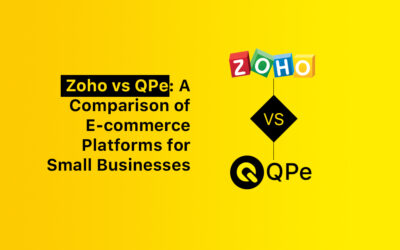E-commerce has benefits and drawbacks just like any other tangible or intangible thing in this universe. E-commerce provides a replacement for regular shops, but there are benefits and drawbacks to employing it for a business. You could be enticed to build an online store and sell your goods there, but you need to know what you’re getting into. Although many business owners love e-commerce, it might not be your industry’s greatest option for your particular industry. In this article, we will talk about E-commerce advantages and disadvantages, so you learn more before kicking start your online business.
As individuals can now purchase anything from online retailers, including groceries, furniture, and other goods, e-commerce has become the new norm. E-commerce is quickly changing how businesses engage with customers and the government.
This article explains the advantages & disadvantages of e-commerce and so that you can assess whether this is the best kind of business for you. These benefits of doing business online will keep you inspired and enthusiastic as you in the path of your business journey.

Advantages and disadvantages of E-commerce
Before we dive into the key benefits and drawbacks of E-commerce, let’s understand what Ecommerce is.
What is E-commerce?
E-commerce (electronic commerce) refers to buying and selling goods on the internet. E-commerce describes business dealings that take place online, like the sale of a product. The virtual store or e-commerce websites often contain a title, an image, and a description for each product.
Some businesses simply sell things online, but for many, e-commerce serves as a conduit of distribution as part of a larger business plan that also includes physical stores and other revenue sources. In either case, e-commerce enables startups, established enterprises, and multinational corporations to sell their goods globally.
Advantages of E-commerce
- Massive Market
E-commerce enables people to connect with clients throughout the nation and around the globe. E-commerce provides a platform for business owners to interact with customers while relaxing in their own homes.
Customers may buy anything they want whenever they want to, and an increasing number of people are becoming accustomed to shopping on their mobile devices. So undoubtedly Ecommerce market is huge and holds a place on Social media with vast audience.
SUGGESTED READ:
Advantages Of E-Commerce for business
- Low Expenses
Operating an online store is significantly less expensive than operating a physical one. You can pay a reasonable charge for web hosting instead of renting commercial real estate.
Additionally, you don’t need to spend money on security for your commercial property, and you also won’t need to worry about paying a warehouse’s rent or hiring staff.
Your domain name, web hosting, the price of creating your website, as well as your inventory, are common expenses with starting an ecommerce store. However, the majority of e-commerce websites take great benefit of marketing on social media.
- Tracking & Analysis of Customers Insights
Ecommerce or online business provides a way to track the traffic and the customers’ entire user journey for businesses, whether they are driving traffic to their eCommerce website through PPC, SEO, ads, or a good old postcard, in order to gain insights into the keywords, marketing message, user experience, pricing strategy, and many other things.
SUGGESTED READ:
Which tools help You to Measure the Success of your Ecommerce Website
- Quick Response to market Demands and Consumer Trends
Business owners who “drop ship,” in particular, benefit from improved logistics since it enables them to react quickly to market demands, eCommerce trends, and consumer wants as well as latest Online Shopping trends.
To draw clients and increase sales with various techniques such as email campaign; business people might also improvise discounts and promotions. The social media audience responds quickly and bring opportunities to understand the latest trends.
- Personalized Messages
e-Commerce platforms allow businesses the chance to offer registered customers, customized content and product recommendations.
By displaying the most pertinent content to each visitor, these tailored messages can aid in increasing conversion.
- Quick Scaling-up (or scaling down) and Unlimited “Shelf Space”
Any online business’ ability to expand is not just constrained by space. Even while logistics may become a problem when a company expands, doing so presents fewer difficulties than managing a physical store.
By utilizing the limitless “shelf space,” owners of e-commerce businesses can swiftly scale up or down their operations in response to consumer and market demands.
Disadvantages of E-commerce
- Miss Personal touch
Some clients value the personalized service they receive from the salespeople when they visit a physical store.
Such a personal touch is especially important for companies selling high-end goods because buyers will want to purchase the goods and have a wonderful experience doing so.
- Security threads
The risk of security attacks exists whenever you conduct business online. Unauthorized users may access your website and view important information if it is not secure.
Rarely, problems with payment processors may result in data breaches that jeopardize the security of customers’ credit and debit card information. Some business owners choose to engage a professional because understanding how to create secure e-commerce websites is a key component of the process.
- Website crash
The worst e-commerce drawback is when your site crashes and no one can purchase anything from your store. Making sure your website is hosted on the appropriate platform is crucial for this reason.
- Cannot try and buy
There are many people who want to try and buy the products. In e-commerce this is the main factor which is faced by many customers.
To tackle this problem, however, businesses are using Augmented Reality (AR) solutions to give their customers a more engaged experience. As more businesses will adopt augmented reality, customers will increasingly be able to try things in-store.
- Shipping issues
The only task involved in operating a physical shop is selling goods to consumers who come in to shop. You can use a straightforward shipping service to send out a few shipments each week if you wish to sell goods over the phone or through a catalogue.
Every purchase made through an online store must be sent, therefore you must plan out all the procedures involved. Finding a seamless shipping solution for your company can be challenging, and you don’t want to go into the red as a result of expensive shipping charges.
- Issues Regarding taxes
In cases where there are different geographic regions, sales tax becomes a problem. Merchants have frequently run into problems while calculating sales tax.
Compliance, accounting, and taxation could become very complicated as a result of this.
Moreover, traditional establishments run the danger of losing customers if online transactions are not subject to taxes.
FINAL THOUGHTS
Mentioned above are some advantages and disadvantages in e-commerce which you can come across.
Due to clients’ increased tendency to shop online rather than in person as a result of pandemics, the field of e-commerce is experiencing rapid growth.
E -commerce may appear to be confusing, but you can really grow your company if you know the benefits and drawbacks of doing business online.
The e-commerce revolution has altered the way that business is done, opening up new opportunities for people across international boundaries. One of the main advantages that a customer receives from online shopping is convenience, which raises customer happiness. This is so that the buyer can make a purchase from any location that has an internet connection.




